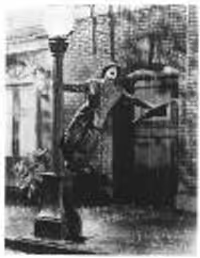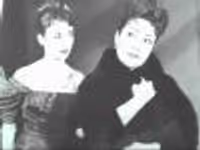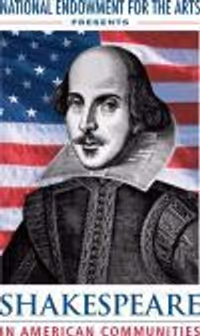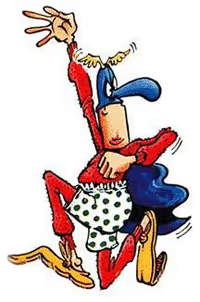Who is the greatest American playwright of all-time?
#1Who is the greatest American playwright of all-time?
Posted: 4/19/07 at 4:44pm
And why?
I suppose the main contenders would be Arthur Miller, Tennessee Williams, Edward Albee, August Wilson and Eugene O'Neill.
The opposite of creation isn't war, it's stagnation.
Kringas
Broadway Legend Joined: 5/27/05
#2re: Who is the greatest American playwright of all-time?
Posted: 4/19/07 at 4:46pm
I'd throw Kushner in the running, too.
nomdeplume
Broadway Legend Joined: 6/20/05
#3re: Who is the greatest American playwright of all-time?
Posted: 4/19/07 at 4:50pmAwww, do I hafta CHOSE?! That's like picking a favorite among your children!
#4re: Who is the greatest American playwright of all-time?
Posted: 4/19/07 at 4:51pm
I was thinking about that Kingras, but I personally don't think that, at this point, he is quite in the realm of the others.
The reason I was asking is because I'm reading all of the major and semi-major works of all of them, so I was just curious as to what everyone thought. I've finished Miller and I've moved on to Albee.
The opposite of creation isn't war, it's stagnation.
SorryGrateful
Broadway Legend Joined: 5/10/05
#5re: Who is the greatest American playwright of all-time?
Posted: 4/19/07 at 4:58pmTennessee Williams is my man. His works are incredible. Thank you. That is all.
#6re: Who is the greatest American playwright of all-time?
Posted: 4/19/07 at 4:59pmDon't forget to add Thornton Wilder to that list. His works are uniquely American, and OUR TOWN, despite its reputation as a high school staple, is a masterpiece of visual imagery in words that works on so many levels at once that when done with care and intelligence it dazzles. We tend to forget its importance in changing the American approach to theater.
#7re: Who is the greatest American playwright of all-time?
Posted: 4/19/07 at 5:00pm
If I HAD to pick one...Arthur Miller. Wow, that was hard.
EDIT: And D2, I was going to mention Wilder.
#8re: Who is the greatest American playwright of all-time?
Posted: 4/19/07 at 5:02pm
Without O'Neill, none of the others would have been able to do what they did. O'Neill created the modern American drama.
Ask me my favorite and I'll give you a different answer.
But as for greatest? I don't know how you can go with anyone other than O'Neill.
Yankeefan007
Broadway Legend Joined: 3/20/04
#10re: Who is the greatest American playwright of all-time?
Posted: 4/19/07 at 5:06pm
I second the Kushner addition and suggest Neil Simon also.
Although if there had to be just one, it would be Eugene O'Neill.
popculture37
Understudy Joined: 8/14/06
#11re: Who is the greatest American playwright of all-time?
Posted: 4/19/07 at 5:09pmEugene O'Neill has perhaps influenced American drama more than any other, but I think our best and most interesting playwright is Thornton Wilder.
#12re: Who is the greatest American playwright of all-time?
Posted: 4/19/07 at 5:11pmArthur Miller.I was fortunate in seeing his DEATH OF A SALESMAN starring George C. Scott many decades ago at the Circle in the Square. At the end everyone in the theatre was crying. I have never been so moved by a play. It was said that Scott put so much of himself into his portrayal that he would get drunk every night after the play. What an actor he was when he was given a great playwright's script.
MargoChanning
Broadway Legend Joined: 4/5/04
#13re: Who is the greatest American playwright of all-time?
Posted: 4/19/07 at 5:15pm
"Greatest" is a completely personal and subjective measure, but I think if you're talking which one was most "important" and most "influential" then you almost have to say Eugene O'Neil who for intents and purposes created what we know as the modern, uniquely American play. He took American drama, which through the early 20s consisted almost entirely of melodrama, light comedy, adaptation of European source materials and vaudeville and (taking a page from Strindberg, Ibsen, and Chekhov) began to write plays which were dramatically realistic with psychologically complex characters (who were often derelects, prostitutes and poor people which was in direct contrast to the sorts of upper class drawing room comedies that so many were writing at the time). He also one of the first American playwrights to write truly experimental works bordering on the avant garde (GREAT GOD BROWN, THE EMPEROR JONES) which pushed existing limitations of the dramatic form. His impact on American playwrighting is pervasive and immeasureable and can be seen in the works of Miller, Williams, Wilder, Inge, Max Anderson, Elmer Rice, and countless others (in the US, Britain and beyond) up to this very day.
You may or may not choose to call him the "greatest," but no other American playwright of the 20th century is more important to world drama.
#14re: Who is the greatest American playwright of all-time?
Posted: 4/19/07 at 5:21pm
"Greatest" is a completely personal and subjective measure
That's what I was asking. Not who was the most influential, but who you personally think has the greatest body of work.
The opposite of creation isn't war, it's stagnation.
#15re: Who is the greatest American playwright of all-time?
Posted: 4/19/07 at 5:25pmI'd still go with O'Neill. His early plays created modern drama and even ushered in the American avant garde (as Margo has pointed out). But unlike all the other authors presented, O'Neill's best work came at the end of his life. ICEMAN would have been an astonishing accomplishment on its own, as would MOON and LONG DAY'S. But taken together, they're overwhelming.
#16re: Who is the greatest American playwright of all-time?
Posted: 4/19/07 at 5:27pmSee, I'm a little embarrassed to say it, but not only have I never seen any of those three plays, but I've never even read them. Which is why I'm going through the plays of all the author's I mentioned.
The opposite of creation isn't war, it's stagnation.
#17re: Who is the greatest American playwright of all-time?
Posted: 4/19/07 at 5:31pm
Margo, in her insetimable wisdom, has hit the nail on the head regarding the importance of O'Neill. It can't be overstated.
I must add, too, that I find it interesting that discussions of 'great playwrights' almost always center on men. There is also a long tradition of great American women playwrights (Susan Glaspell, Rachel Crothers, Sophie Treadwell, Tina Howe, Paula Vogel, Suzan Lori Parks) whose work should be read and considered along with Williams, Miller, Wilder, et al.
Let me also suggest some of my favorites. They're not the greatest, but they are great: George S. Kaufman and Moss Hart, Sam Shepard, David Mamet, Charles Ludlam, John Guare.
MargoChanning
Broadway Legend Joined: 4/5/04
#18re: Who is the greatest American playwright of all-time?
Posted: 4/19/07 at 5:45pm
Reading O'Neill's plays in order can have the effect of giving you a portrait of the birth, adolescence and adulthood of American drama through the mind of one man. From his shorter, political, penetrating early dramas (Beyond the Horizon, The Emperor Jones -- check out the Paul Robeson film; The Hairy Ape; Anna Christie -- check out the Garbo film version), to his epic melodramas (Mourning Becomes Electra -- which resets the Orestes trilogy on a Civil War plantation; and the highly experimental Strange Interlude) to his late tragic masterpieces (Iceman -- check out the filmed tv version with an extraordinary Jason Robards; Mourning -- the Robards-Colleen Dewhurst production is on DVD and is a landmark in American theatre; and Long Days -- there are several versions available but I think the Katharine Hepburn, Sir Ralph Richardson, Robards, Dean Stockwell version may be the best), O'Neill singlehandedly turned American drama into a major international artistic force (he's still the only American playwright to win the Nobel Prize in Literature).
Now, some complain that he can be redundant, overlong and overly wordy and that his poetic gifts aren't quite on a par with later masters such as Tennessee Williams and August Wilson, but taking his works as a whole and considering the context of the time during which he was writing (when he had no model to follow, but his own) he's acomplishments are downright miraculous.
#19re: Who is the greatest American playwright of all-time?
Posted: 4/19/07 at 5:45pm
Eugene O'Neill-spent an entire graduate level course on him
-inventor of modern American drama!
#20re: Who is the greatest American playwright of all-time?
Posted: 4/19/07 at 5:50pmEugene O'Neill. His body of work speaks for itself, but if I had to put it in my own words, I would say that the greatest argument would be that his work blended many different genres into a truly singular dramatic voice. He was also one of the first American playwrights to delve into the psyche of the characters he presented. His plays still pack quite a punch today, which is a testament to his genius.
Thesbijean
Broadway Legend Joined: 12/9/04
#21re: Who is the greatest American playwright of all-time?
Posted: 4/19/07 at 6:01pmI would have to say that Eugene O'Neill is the father of American drama, but, I would annoint ARTHUR MILLER with the title of Greatest American Playwright. The Crucible and Death of a Salesman, enough said...
#22re: Who is the greatest American playwright of all-time?
Posted: 4/19/07 at 6:01pmI have to throw Lanford Wilson into the mix - his works are astonishing. The Talley Family Trilogy, Balm in Gilead, Burn This, Serenading Louie, Hot l Baltimore, Lemon Sky, The Mound Builders, Redwood Forest, Angel Falls, The Rimers of Eldrich, The Madness of Lady Bright . . . While I concede he may not be the "greatest," he is certainly my favorite.
#23re: Who is the greatest American playwright of all-time?
Posted: 4/19/07 at 6:13pmWhile I concur that O'Neill is the greatest, Miller is probably my favorite. Just like I prefer Ibsen to Chekhov.
MargoChanning
Broadway Legend Joined: 4/5/04
#24re: Who is the greatest American playwright of all-time?
Posted: 4/19/07 at 6:23pm
I agree with Professor that to get a full picture of the breadth and scope of American drama, one needs to go beyond the giants such as O'Neill, Williams, Miller, Wilder Inge, and Albee. There's a long list of notable and terrific playwrights, some of who only produced one or two great plays, but are certainly well-worth reading. I could probably come up with a fairly comprehensive list with a little time (and would be glad to recommend titles of individuals plays if you so choose), but off the top of my head some of the important American ones to add to Professor's list (in no particular order):
Clifford Odets
Lillian Hellman
August Wilson
Lanford Wilson
Maria Irene-Fornes
Leroi Jones
Adrienne Kennedy
Wendy Wasserstein
David Rabe
Douglas Turner Ward
Christopher Durang
David Henry Hwang
There are, of course others. And you should also think about supplementing your reading list with several Brits and Europeans, some of whom are a even more important than most of the people mentioned here (Beckett, Brecht, Pinter, Stoppard, Genet, Giradoux, Shaw, Coward, Ayckbourn, Frayn, Friel, Wilde, Ionesco, Pirandello, Shaffer, Nichols, and SO many others).
Videos










